SUMMARY
Considering the quality, quantity, and diversity of films distributed under the Netflix banner, GLAAD has rated Netflix as POOR.
Netflix’s LGBTQ inclusion was inconsistent in 2024 with some strong films with unique characters but also one film which notably missed the mark in storytelling. The streamer released Good Grief, an intimate look at a gay man grieving his husband; Rez Ball, which features a queer Indigenous basketball coach; Mother of the Bride, which highlights the lead’s brother and his husband; and Time Cut, which has a side story of a teen lesbian choosing to embrace her identity and relationship in a more difficult time period. All these stories included interesting and nuanced LGBTQ characters. Other Netflix releases included queer characters in more background roles including A Family Affair, Meet Me Next Christmas, Incoming, and Players.
While the above titles tell varied and diverse queer stories, the most notorious and contentious Netflix release of 2024 was Emilia Pérez, an acquisition out of Cannes which received a major awards season push from the streamer and a larger marketing spend than stronger inclusive titles. Once GLAAD and other film critics and journalists were able to see the film, it was strongly criticized for its retrograde portrayal of a Mexican trans woman. At a time when political leaders are peddling dangerous lies about trans people and transgender characters in film and TV have largely disappeared, authentic trans stories are more necessary than ever. But Emilia Pérez, Netflix’s only trans-inclusive film this year, is a case study in what not to do when it comes to trans storytelling. The fact that Netflix, the same company that acquired and released the documentary Disclosure, which warns of the real-life harm caused by stereotypical transgender representation, not only bought and distributed Emilia Pérez, but mounted a multimillion-dollar awards campaign for it, is extremely disappointing. Netflix’s decision to buy, release, and promote this film shows just how much more education needs to be done with Hollywood film executives. The GLAAD Media Institute is available to identify strong titles from the festival circuit that are more deserving of acquisition and promotion.
Note: Films distributed by Netflix do not share their theatrical release numbers publicly and the company declined to provide this information for this study. As such, there is no information cited in this study about their widest theatrical release.
HISTORY
Netflix Inc. launched its streaming platform in 2007—nearly a decade after the company began its DVD-by-mail rental service—and has distributed original films since 2015 with the release of Beasts of No Nation. As the COVID pandemic shut down theaters in 2020, the streamer purchased and released a plethora of films originally scheduled for theatrical release from other distributors. Netflix then announced an agreement with Sony Pictures Entertainment for a first-look deal for future direct-to-streaming films produced by Sony Pictures in 2021. As of 2022, half of the total film library available in the U.S. are Netflix original titles. The Netflix DVD service was officially shuttered in 2023.
As Netflix has historically one of the biggest distributor outputs with hundreds of new films per year, the quality and quantity of Netflix’s LGBTQ representation has had highs and lows. Standout inclusive titles from Netflix include GLAAD Media Award nominees and recipients The Boys in the Band, Ma Rainey’s Black Bottom, and The Half of It, The Old Guard, Tick, Tick… Boom!, The Mitchells Vs. The Machines, Single All the Way, and The Fear Street Trilogy (2021), Do Revenge, and Wendell & Wild (2022), Nuovo Olimpo, Nyad, Rustin, and Nimona (2023), among others.


 The sequel to Beverly Hills Cop sees the return of Serge, an old friend of protagonist Axel. Serge briefly appears to help Axel gain access to a mansion for Axel’s case. Once there, Serge takes the opportunity to ogle the genitalia of the male statues in the mansion. His sexuality is barely remarked upon, but also isn’t fully a punchline. Serge’s time in the film is brief, but he is influential to the plot in forwarding Axel’s investigation, thus making the film squeak by in passing the Vito Russo Test.
The sequel to Beverly Hills Cop sees the return of Serge, an old friend of protagonist Axel. Serge briefly appears to help Axel gain access to a mansion for Axel’s case. Once there, Serge takes the opportunity to ogle the genitalia of the male statues in the mansion. His sexuality is barely remarked upon, but also isn’t fully a punchline. Serge’s time in the film is brief, but he is influential to the plot in forwarding Axel’s investigation, thus making the film squeak by in passing the Vito Russo Test.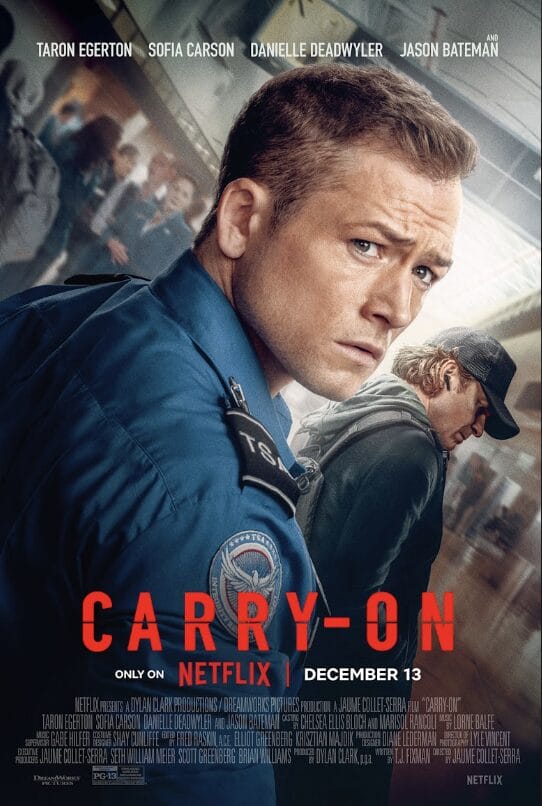 This action-thriller follows Ethan, a TSA agent who is forced into letting a man carrying a suitcase with a dangerous chemical weapon through the airport as they threaten to kill his wife if he disobeys. The man carrying the suitcase is Mateo, who it is later revealed is only involved because the criminals behind the attack have threatened his husband Jesse and are holding Jesse hostage to ensure Mateo’s cooperation. Later, still trying to save his husband, Mateo is told to kill Ethan but his gun backfires and he dies. Later, Jesse ends up saving Ethan and his wife and aiding him against the antagonists. Though neither Mateo or Jesse were main characters, they were significant to the plot and their love was treated with the same weight as the main straight couple in the movie. While Mateo does die, he is one of many characters that die in this movie and he is not treated any differently by the narrative due to his sexual orientation.
This action-thriller follows Ethan, a TSA agent who is forced into letting a man carrying a suitcase with a dangerous chemical weapon through the airport as they threaten to kill his wife if he disobeys. The man carrying the suitcase is Mateo, who it is later revealed is only involved because the criminals behind the attack have threatened his husband Jesse and are holding Jesse hostage to ensure Mateo’s cooperation. Later, still trying to save his husband, Mateo is told to kill Ethan but his gun backfires and he dies. Later, Jesse ends up saving Ethan and his wife and aiding him against the antagonists. Though neither Mateo or Jesse were main characters, they were significant to the plot and their love was treated with the same weight as the main straight couple in the movie. While Mateo does die, he is one of many characters that die in this movie and he is not treated any differently by the narrative due to his sexual orientation.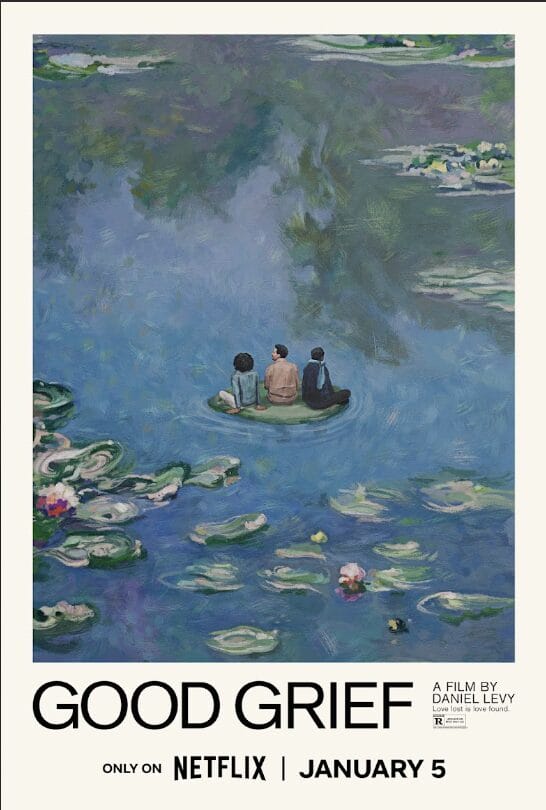 Good Grief tells the story of Marc, who deals with his grief after his husband Oliver dies in a car accident. A year after the accident, Marc travels to Paris, spurred by a letter from Oliver, where he tells Marc that he has a lover in Paris, and by Oliver’s accountant, who tells Marc about a secret apartment there. Marc takes his good friends Sophie and Thomas, who is also gay, with him on the trip without telling them the reason for the trip. While in Paris, Marc goes on a date with a new man, Theo, who he first met back in New York, and also meets his husband’s former lover, Luca. All these relationships help Marc process his grief and come to terms with his own flaws and his mistakes in his relationship with Oliver, as well as in his friendships with Sophie and Thomas. The film is unique in including various kinds of platonic and romantic relationships among primarily queer people, and ultimately depicts the complicated nature of losing a loved one and having unresolved business from an uncommon perspective.
Good Grief tells the story of Marc, who deals with his grief after his husband Oliver dies in a car accident. A year after the accident, Marc travels to Paris, spurred by a letter from Oliver, where he tells Marc that he has a lover in Paris, and by Oliver’s accountant, who tells Marc about a secret apartment there. Marc takes his good friends Sophie and Thomas, who is also gay, with him on the trip without telling them the reason for the trip. While in Paris, Marc goes on a date with a new man, Theo, who he first met back in New York, and also meets his husband’s former lover, Luca. All these relationships help Marc process his grief and come to terms with his own flaws and his mistakes in his relationship with Oliver, as well as in his friendships with Sophie and Thomas. The film is unique in including various kinds of platonic and romantic relationships among primarily queer people, and ultimately depicts the complicated nature of losing a loved one and having unresolved business from an uncommon perspective.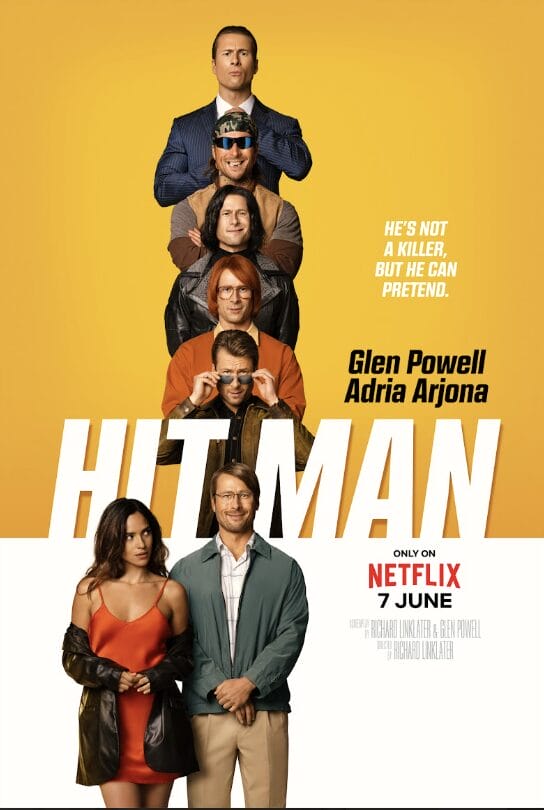 This film follows professor and undercover police officer Gary who poses as a hit man to catch people who solicit assassins. Over the course of the film, Gary works closely with fellow police officers, Claudette and Phil, and takes on many personas for his work. One of these personas is Ron, who both Claudette and Phil find cool and attractive versus Gary’s real persona. Claudette says she would sleep with Ron and Phil agrees, saying he would “take her sloppy seconds.” Though it is only a brief moment, this exchange is indicative of Phil’s attraction to men overall and a welcome moment of casual inclusion.
This film follows professor and undercover police officer Gary who poses as a hit man to catch people who solicit assassins. Over the course of the film, Gary works closely with fellow police officers, Claudette and Phil, and takes on many personas for his work. One of these personas is Ron, who both Claudette and Phil find cool and attractive versus Gary’s real persona. Claudette says she would sleep with Ron and Phil agrees, saying he would “take her sloppy seconds.” Though it is only a brief moment, this exchange is indicative of Phil’s attraction to men overall and a welcome moment of casual inclusion.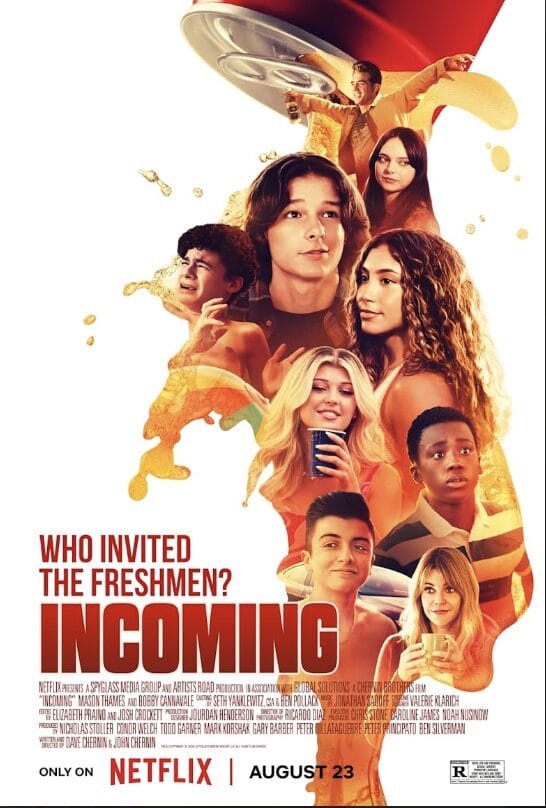 This teen comedy follows a group of incoming high school freshmen who want to build a new reputation from who they were in middle school. The lead character is Benji, whose sister Alyssa spends most of the film complaining about her ex-girlfriend’s new girlfriend. Though her character is often mean and judgemental, she has a growth arc when her ex calls her out on this behavior. Alyssa also helps her brother out with his crush. There is also other casual queer representation in the film, mostly in smaller and background roles, which is accurate to the Gen Z cohort depicted and will connect with this audience as reflective of their world and friends.
This teen comedy follows a group of incoming high school freshmen who want to build a new reputation from who they were in middle school. The lead character is Benji, whose sister Alyssa spends most of the film complaining about her ex-girlfriend’s new girlfriend. Though her character is often mean and judgemental, she has a growth arc when her ex calls her out on this behavior. Alyssa also helps her brother out with his crush. There is also other casual queer representation in the film, mostly in smaller and background roles, which is accurate to the Gen Z cohort depicted and will connect with this audience as reflective of their world and friends. This romantic comedy follows Layla, who is seeking tickets for a sold out concert to see the well known real-life acapella group Pentatonix, and Teddy, the man she hires to help her find them. All the members of Pentatonix get involved in the search for tickets, including Scott Hoying and Mitch Grassi, both of whom are out as gay. The film also includes short moments at a talent competition which features Canada’s Drag Race contestant Queen Priyanka as herself.
This romantic comedy follows Layla, who is seeking tickets for a sold out concert to see the well known real-life acapella group Pentatonix, and Teddy, the man she hires to help her find them. All the members of Pentatonix get involved in the search for tickets, including Scott Hoying and Mitch Grassi, both of whom are out as gay. The film also includes short moments at a talent competition which features Canada’s Drag Race contestant Queen Priyanka as herself. Mother of the Bride follows a wedding party who have gathered at a tropical island resort and centers on Lana, who finds out that the father of her son-in-law-to-be is actually her own college ex-boyfriend Will. Will’s brother Scott and his husband Clay are part of the wedding party and serve as Will’s support system. Though Scott primarily exists to further his straight brother’s story more than developing his own plotline, he has enough screentime and personality to move past the all too familiar gay best friend or sidekick archetype.
Mother of the Bride follows a wedding party who have gathered at a tropical island resort and centers on Lana, who finds out that the father of her son-in-law-to-be is actually her own college ex-boyfriend Will. Will’s brother Scott and his husband Clay are part of the wedding party and serve as Will’s support system. Though Scott primarily exists to further his straight brother’s story more than developing his own plotline, he has enough screentime and personality to move past the all too familiar gay best friend or sidekick archetype. Players follows four best friends who routinely run “plays” at bars to hook up with other people. One of these friends, Brannagan, is bisexual and uses these tricks to sleep with men and women, although it’s noted early on in the film that it has been a while since he picked up a man. This is something his friends are aware of and they are very accepting and casual about his sexuality. Featuring a bisexual man in this type of movie is laudable, as bi+ men are so often excluded from media and other cultural conversations about the community. However, it is worth noting how the film itself treats him differently in that Brannagan’s hook ups are never shown on screen the way the straight characters’ are and he is the only one who ends the film without a partner. While his inclusion is a step in the right direction, it would have been further improved if he had the same screen time and growth in romance as the straight characters in this film.
Players follows four best friends who routinely run “plays” at bars to hook up with other people. One of these friends, Brannagan, is bisexual and uses these tricks to sleep with men and women, although it’s noted early on in the film that it has been a while since he picked up a man. This is something his friends are aware of and they are very accepting and casual about his sexuality. Featuring a bisexual man in this type of movie is laudable, as bi+ men are so often excluded from media and other cultural conversations about the community. However, it is worth noting how the film itself treats him differently in that Brannagan’s hook ups are never shown on screen the way the straight characters’ are and he is the only one who ends the film without a partner. While his inclusion is a step in the right direction, it would have been further improved if he had the same screen time and growth in romance as the straight characters in this film. Rez Ball follows an all Native high school basketball team and their progress towards the state championship following the tragic death of their star player. The team coach, Heather, recently moved back to Chuska, New Mexico to take the job leading the team. During the film, she is seen texting another woman, Alena, and it’s clear that they were once a couple but Alena broke it off prior to Heather’s move. One of the player’s mothers also references Heather having dated men and women in high school. A queer Indigenous woman leading a high school sports drama is a rarity and worth lauding, though we wish audiences would’ve seen more of Alena and Heather’s relationship or potentially a future partner in Heather’s new town.
Rez Ball follows an all Native high school basketball team and their progress towards the state championship following the tragic death of their star player. The team coach, Heather, recently moved back to Chuska, New Mexico to take the job leading the team. During the film, she is seen texting another woman, Alena, and it’s clear that they were once a couple but Alena broke it off prior to Heather’s move. One of the player’s mothers also references Heather having dated men and women in high school. A queer Indigenous woman leading a high school sports drama is a rarity and worth lauding, though we wish audiences would’ve seen more of Alena and Heather’s relationship or potentially a future partner in Heather’s new town.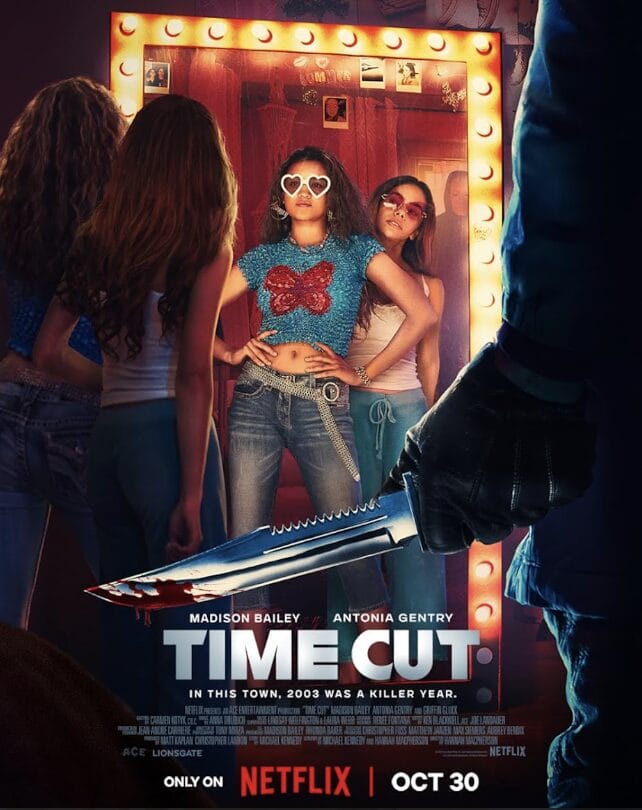 This time travel-slasher movie follows Lucy as she goes back in time to save her sister, Summer, who was murdered before Lucy was born. Back in time, Lucy discovers that Summer is a closeted lesbian and in love with her best friend Emmy. Summer and Emmy had made a pact to come out together despite Summer’s initial fears. By the end of the movie, Summer declares her love for Emmy at the Spring Fling and they kiss. Both characters also survive the events of the film after Lucy changes the timeline. This relationship was a surprisingly wholesome angle and helped ground the story.
This time travel-slasher movie follows Lucy as she goes back in time to save her sister, Summer, who was murdered before Lucy was born. Back in time, Lucy discovers that Summer is a closeted lesbian and in love with her best friend Emmy. Summer and Emmy had made a pact to come out together despite Summer’s initial fears. By the end of the movie, Summer declares her love for Emmy at the Spring Fling and they kiss. Both characters also survive the events of the film after Lucy changes the timeline. This relationship was a surprisingly wholesome angle and helped ground the story.










